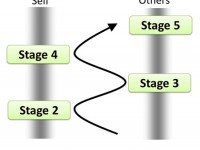In this course, team leaders and team coaches acquire new competences pertaining to working with teams. Specifically, they learn to experience work with team members from a social-emotional perspective and therefore are able to discern different levels of team maturity. Immersing themselves in different ways of meaning making, they also come to understand that the cognitive level of discourse of a team, that is, complexity and fluidity of the discourse, is a function of team members’ maturity both in *thinking* and *meaning-making*. By sharpening their expertise for intuitive as well as reflective work with teams, participants prepare themselves for functioning at a higher level of leadership than they have so far been able to operate on.
The practical highlight of the course is that participants are introduced to dialectical thinking, a form of holistic, systemic, and transformational reading of, and responding to, the real world. Although the practice of dialectical thinking in this course is not as extensive as in the subsequent case study, participants gain a fair foothold in reflecting on how, rather than what, team members think, and this gives them new tools for intervening with teams they lead or manage. It also opens a door for them to turn their teams in “learning teams”, that is, teams that can self-coach regarding their way of thinking about interpersonal process and task process alike.
Students will be asked to submit a concise description of a team they are working with; their descriptions will provide the focus around which CDF tools are introduced and practiced in class. The study cohort itself will serve as a team to practice on.
